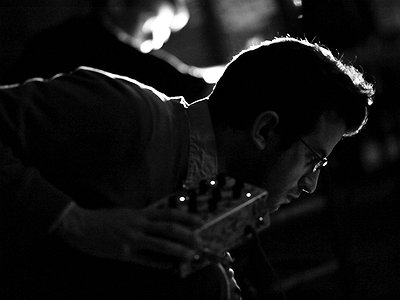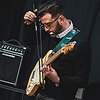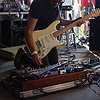Part 1
Name: Daniel Wyche
Occupation: Guitarist, composer, improviser.
Nationality: American
Current Release: Daniel Wyche's Earthwork, an album "inspired by family, loss, and legacy" and recorded with an ensemble featuring guitars, cello, vibraphone, bass clarinet, and electronics, is out via American Dreams.
Recommendations:
1. My favorite artist in the city of Chicago, for years now, has been my friend Allen Moore. Allen is a visual artist who also makes music/sound art using turntables and custom-pressed records that he makes from all kinds of materials: mud, graphite, etc. His new one, Lived a Devil, came out in June of 2021 and it is groundbreaking.
2. Jessica Ackerley is an incredible Canadian guitarist who just moved to Hawaii after living in New York for years. There are more amazing guitarists right now than you can count, but Jessica’s playing has been especially challenging and exciting for me for quite a while. Jessica has just released a duo record with the legendary Daniel Carter called Friendship: Lucid Shared Dreams and Time Travel. It is an absolute must-listen.
[Read our Jessica Ackerley interview]
If you enjoyed this interview with Daniel Wyche and would like to stay up to date on his activities, visit his official website for more information.
When did you start writing/producing music - and what or who were your early passions and influences? What was it about music and/or sound that drew you to it?
I grew up in a house (and in cars for that matter) full of music. I was a kid in the 1980s, and my parents, who were quite young at the time, loved the music of the late 60s and 1970s, mostly what is now called “classic rock.” While that was the major soundtrack, my mom was always a Smokey Robinson fan, and my grandparents had a love for the music and film of the big band era, so there was at least one way that jazz, or jazz-type sounds and themes, made it into my ears as a child.
However, like almost everyone else my age, and from a place like the place I am from, demographically and otherwise, the main thing was classic rock. And I remember realizing when I got older that this music, things like the Who, the Doors, Rolling Stones, Zeppelin, and, above all else, Jimi Hendrix, was not actually that old when I first started hearing it. As a kid I was obsessed with my parents’ records, in part just because the artwork was so fun and mesmerizing. I would sit for hours and turn the wheel on the Led Zeppelin III record (still my favorite from that band), a record that came out in 1970, barely 20 years later in the late 80s and early 90s. That’s just one example, so much of the music from the 70s, records that seemed “classic”—at least, because the radio said they were “classics” over and over—were only born a few years before I was, and understanding that we were in some sense aging together, rather than this music being kind of ossified in some way—despite so much effort expended to make it seem that way—was a revelation.
Along with my parents and their listening habits, my mom’s brothers, especially my uncle Vincent, were a huge influence. While my mom has been a kid in the 60s, he was a bit older and had a different kind of relationship to all of the music of the time. We spent a lot of time hanging out, and he’d make these mixtapes: the Who were arguably his favorite and Black Sabbath possibly a close second (the drums on "Hand of Doom", which he always told us to listen to carefully, were lifechanging), but there was a lot of Neil Young and so much else.
At the center though was Hendrix, as he was and is for so many people, truly exhilarating: here was something so precise, so skilled, and so weird, while still being so much fun. It’s an influence and a moment you can spend a lifetime considering. Andrew Clinkman once said to me while we were in a booth at the Beat Kitchen in Chicago that no one has had done as much to push the instrument forward, and I think that’s right.
Along with the great amount of listening I would do around family, my dad also had an acoustic guitar, an Ibanez that is still in his house somewhere, and he’d play a few songs for us: some folk songs, Cat Stevens songs, Harry Chapin, things like that. I was obsessed with this guitar as a kind of object. As much time as I spent sitting with records, mesmerized by the physicality of the music and the records and sleeves themselves, I would spend with that guitar just kind of exploring it in what I would now call kind of percussive ways. He also had an old Harmony from the 60s, his own first guitar, which I still have, and I’d do the same with that: sit it on my lap, drop the picks into the strings, hit a note and see how long I could let it resonate, and so on. I did this for hours every day before finally, when I was around 11, asking my parents to get me guitar lessons.
For most artists, originality is preceded by a phase of learning and, often, emulating others. What was this like for you: How would you describe your own development as an artist and the transition towards your own voice?
It’s really unclear to me that this stage of emulation ever really ends, though we can definitely see different stages of that stage, if that makes sense. Maybe it’s a question of how we bring that emulation home and make it our own. It may be a question of more and more sophisticated forms of emulation: first attempting to play like someone else plays. I think like anyone I started out this way, trying to play just like Hendrix or Page, or something. Eventually I realized that I probably couldn’t, but I realized that was ok.
Then there was a period of trying to “sound like” others in terms of asking: what resources are they using in order to make these sounds. Maybe not because I want to make those exact sounds, but because I think maybe I can do something interesting with those sounds. A major figure there is Matt Talbot of the band Hum, arguably my favorite band at the end of the day. In the song “The Pod” on the second album, You’d Prefer an Astronaut, there is a feedback solo.
Along with my cousin and main collaborator for my entire life, Mike Nicosia, I became obsessed with both the general sounds of that record, but also that specific thing. I loved the way someone like Hendrix (again) used feedback, but here was someone being extremely intentional about it in a rather different context. Mike figured out that Matt Talbot was using something called the Boss DF-2 Super Distortion & Feedbacker (the name was later switched around to “Super Feedbacker & Distortion), an early Boss pedal from 1984. This became the center of another “stage” of emulation: using the same tool to take some similar ideas—ideas inspired by its initial use—in a new direction. Now I use a Caroline Guitar Co. custom Cannonball (it has a bear painted on it) to get a similar effect, but I have much more control over the feedback, etc.
This isn’t a full breakdown, but another stage would be asking how to achieve some of the less tangible, emotional registers that you find others able to invoke. This is again not about imitation or simply copying, but I think a fundamental form of inspiration. You hear something and you realize some of the affective register, the emotional component, those are things you’d like to be able to invoke as well. And you start looking after the techniques and equipment and the like that allow others to approach that, and then ask: how can I bring this home, make it my own, use it to say what I hope to say, and still do so while showing that I am grateful to this other person’s work for helping me find the tools that I need to tell the story I want to tell?
On this last note: I realized recently that my guitar playing has been inspired a lot more by percussionists than by other guitar players in the last decade, especially the extended techniques used by free-improvising percussionists and people working in New Music. In 2008 I saw the legendary drummer (and now friend) Frank Rosaly perform at Vox Populi in Philly. That was over a decade ago and, on some level at least, I still have not recovered.
What were your main creative challenges in the beginning and how have they changed over time?
When you are young, a major problem can be both the challenges of cultivating a skill on an instrument, but also the barriers that get put up by the idea that you have to cultivate whatever practical skills in order to be “ready” to actually make something and perform it or show it to others.
In the first case, there’s an issue of time: having the time to really work on your instrument, whatever it is, your relationship to yourself, your own ideas, and so on. This never changes however, and the problem of just having the time to work, squeezing it in between day-jobs, setting it aside for moments when you’d otherwise—and justifiably—just want to relax, and so on.
In the second case, the primary creative challenge, early on anyway, is ignoring whatever is telling you that you have to be “ready” to make something and to share it with others. I wonder how many artists never went on tour, never made a record, and so on, because they didn’t feel their work was “ready,” or “good enough yet,” or that their band was “tight enough,” or the like. Sure, sometimes things aren’t actually ready, but that worry itself, I suspect, is holding any number of incredible artists back right now.
I think that this second thing is a form of anxiety, and anxiety is persistent, so from there it transforms, just like the problem of having time. There’s a moment that isn’t so much about getting something off the ground, but deciding it’s finished. I have a problem with taking a very long time to finish anything. I think this is in part because my job keeps me away from making music as much as I’d like. On the other hand, sometimes you get so far into a project the stasis of incompletion itself becomes something comfortable to sit in and swim in the process itself. This is an intoxicating and sometimes profoundly enjoyable place to be, though even the best parts of it can’t last forever, and the fruit just ends up rusting out on the vine.
For me right now anyway the primary creative challenges are things like this, and a few others. I have a sleep disorder and I am extremely fatigued all the time. I have a very busy job so after work it is hard to make the time I need to settle into creating when I am also extremely tired. I get anxious about not doing things right and sometimes just put them aside, or work on them so long, they stop being interesting to me. I also end up conceiving of new projects that, as I’ve said elsewhere, require me to collect a lot of new equipment and develop new skillsets—all of this is time consuming, and when you can’t sleep, it leaves precious little time to really get anything off the ground (or to land what’s already in the air).







